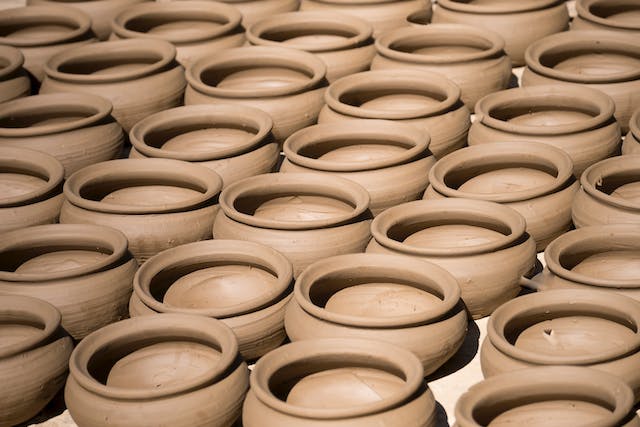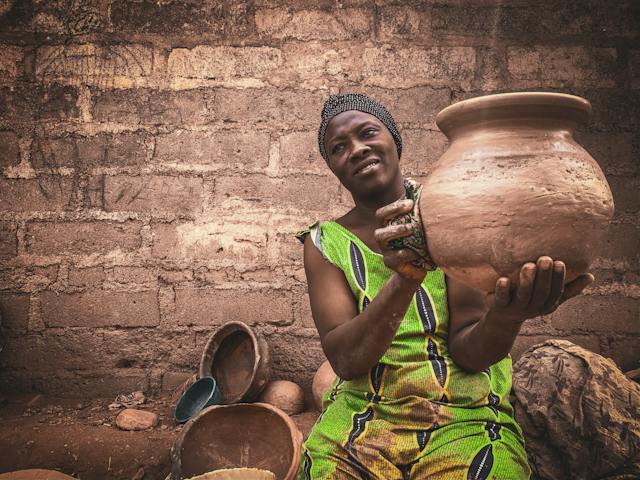Here’s a quick comprehensive guide to embark on a journey into the thriving world of pottery business in Nigeria, where creativity meets commerce.
Let’s dive in.
Table of Contents
Brief Historical Background
Pottery business in Nigeria has been in existence as far back as 16AD.
In the olden days, most especially during the pre-colonial and colonial era when aluminum pots or fridges were nowhere to be found, clay pots were in vogue and people patronized pottery business in Nigeria for household needs and kitchen utensils.
The practice of pottery business in Nigeria was common among the women folk.
The pottery business of trading with products of pottery was effectively managed by the women in spite of the burden of carrying the fragile wares from one location to another after production.
Early Participants in Pottery Business
During those early days, the main participants in the pottery business in Nigeria took the pots to sell in places such as Kogi, Oyo and Kwara states.
They travelled on foot for days and some carried it on their heads while others carried it on horses.
Then, the foremost people in the pottery business in Nigeria were popularly known as ‘Isan Amokoko’ meaning Isan people who create wonders with clay.
Some pots were made to look like dispensers and the water kept inside them would stay cool for a long period of time.
Up till now, there are older women in Nigeria who still make use of clay pots to preserve their soups, to keep it warm and to keep their drinking water cool.
The emergence of aluminum pots and fridges hindered the pottery business in Nigeria and pulled down the revenue from pottery business.
There’s a time the government made concerted efforts to keep the pottery business in Nigeria thriving during the Better Life programme of former President Ibrahim Badamosi Babangida (IBB).
The then Government set up a facility at the Irefe quarters to facilitate the promotion of pottery business in Nigeria.
In this guide, we’ll walk you through the essential steps to turn your passion for pottery into a lucrative venture.
From understanding both old and modern production techniques to the marketing of pottery products to honing your craft, it’s time to mold your dreams into a successful reality.
How to Start a Pottery Business in Nigeria

Image of Local pots
In Nigeria, Pottery business is all about production and marketing of pottery products on a small scale for profit purpose.
Pottery is simply creating tangible objects out of clay through the process of mixing clay with water; and shaping the mixture into pottery products or pottery wares such as: pots, cups, plates, bowls, vaults, urns and candle holders, etc.
Pottery as art still has a veritable market in Nigeria, the market structure and demand for pottery products is generally wide as they may be sold in places like curio shops, art kiosks, trade fairs, exhibition, and other places.
The market demand for pottery products is wide since they are multipurpose and the products can be sold for many different users.
Pottery products are used for various purposes such as: decorations, flower vases in workplaces, schools, lodges and households; while some products can be exported.
Start your pottery business in Nigeria by setting your pottery business aims and objectives.
Clearly identify your niche, whether it’s traditional pottery, contemporary art pieces, or functional ceramics.
Develop your unique selling proposition to set the framework for a distinctive brand in the market.
Carry out competitive analysis and market research to identify trends and preferences and to make sure your pottery wares align with consumer preference.
Related: A Good Business Ideas in Nigeria
Production Technique Used in Pottery
The production technique used in pottery is relatively simple as it mainly involves modelling red clay by hand, shaping tools and paint for decorating.
Pottery production technique involves mixing clay with water; and shaping the mixture into various pottery products such as pot, local plate, jug, vase, piggy bank.
The modelled objects are then exposed to heat to dry then put in a kiln for burning to get the final product. Basically, making pottery products involves modelling, moulding, decorating and heating.
After mixing the clay thoroughly, the potter collects the quantity of clay they need and moulds it.
There is no scale for letting measurement, whatever the potter those days, they carried out their operations based on their discretion.
After moulding, each pottery scoops the pottery wares inside and then shine the edge of the pot with stones. At times, the local potters attach different designs to the fabricated pots using local apparatuses.
After that, they dry their new pottery products under the sun. When they’ve gathered about 30 to 40 pots, they take it to the open field for firing.
The time duration for firing is for two hours or more with firewood and dry grass. The firing is a process to solidify your pottery products; firing prevents the clay from melting when water is poured inside it.
In pottery, the colouring is done with “makuba” immediately after firing. “Makuba” is the husk of locust beans.
The potter soaks the husk of locust beans in water for a while and then dip the hot pot inside the mixture to colour the pot.
Once the pot is coloured, the pot is left to dry and then readily available for use. Follow the same process if you want to make local pots, plates and jugs.
Modern Production Technique
Let’s have a brief talk about the modern production technique.
The modern method is a bit technical and involves standard measurements. Under this pottery production technique, make sure you soak the clay and kaolin in water to ferment for three days, after that, sieve your mixture through a mesh
There are different stages of moulding, such as circling, centring, opening, pulling and shaping.
During the shaping, make efforts to come up with your target audience’s preference and what they will cherish and willing to buy your products.
The firing has the same function as in the local method of production but uses a different approach: the bricks firing and the glaze firing.
The glaze firing is very expensive and capital intensive; nevertheless, the modern method is stronger and more durable than the local method.
This is the same method of producing ceramics. If only you had enough funding to procure glaze firing, you will be making more money from ceramics.
You can use this method to make flower vases, piggy banks, planters, different shapes of ornaments or ceramic plates and mugs.
Materials Needed to Start a Small Pottery Business
Materials needed to start a small pottery business in Nigeria include the following;
- Basins
- Hoes
- Kiln
- Medium working table
- Jerry cans
- Clay
- Grass
- Water
- Sand particles
- Firewood or modern source of heating
- Oil paint
- Overhead costs for labour and transportation
The most important ingredient to create remarkable pottery products hinges on quality clay.
It’s advisable you choose reliable local suppliers to get a steady supply of this essential raw material.
It’s equally essential to equip your workspace with the essential tools of the trade. Get a quality pottery wheel, kiln, and a variety of hand tools.
A well-furnished studio will enhance your efficiency and the overall quality of your pottery products. Don’t forget to prioritize safety by incorporating protective gear such as gloves and aprons.
How Profitable is Pottery Business in Nigeria?
In Nigeria, an individual who practise the pottery business could make 20 to 30 pieces of clay jugs or plates in a day. They sell smaller ones for N200 and bigger ones for as much as N300 and above.
Such an individual achieve revenue of ₦4,000 to ₦9,000 once they sell their outputs. People order thousands of locally made pots for sale and even for export.
These local pots are historical and portray our cultural identity.
Even till date, people still cook and store water in the pot just like in the olden days. There is a popular myth that eating from the locally made plate is medicinal.
These pots produce natural coolness to the water inside it and because of the medicinal properties;
some people believe that drinking water from the pot can relieve pains and ailments such as chest pain and some other ailments.
Pottery is one of the crafts of ancient Nigeria that is still being practised in most parts of the country today. It is Nigeria’s most cultural material that has caught the attention and interest of early British archaeologists.
Youths, most especially young ladies, are urged to venture into the pottery business as it was a skill that would earn them a decent means of livelihood.
Conclusion
The pottery business requires creativity and patience because it’s difficult to produce and sell the same day, whereas nowadays youths want quick money, that’s why it is hard to see any of them around in pottery business.
But whoever can exercise patience and learn this skill, he/she will earn a lot of money from pottery business in Nigeria.
Also, it can be a means to generate foreign exchange earnings and improve the country’s Internally Generated Revenue (IGR)


